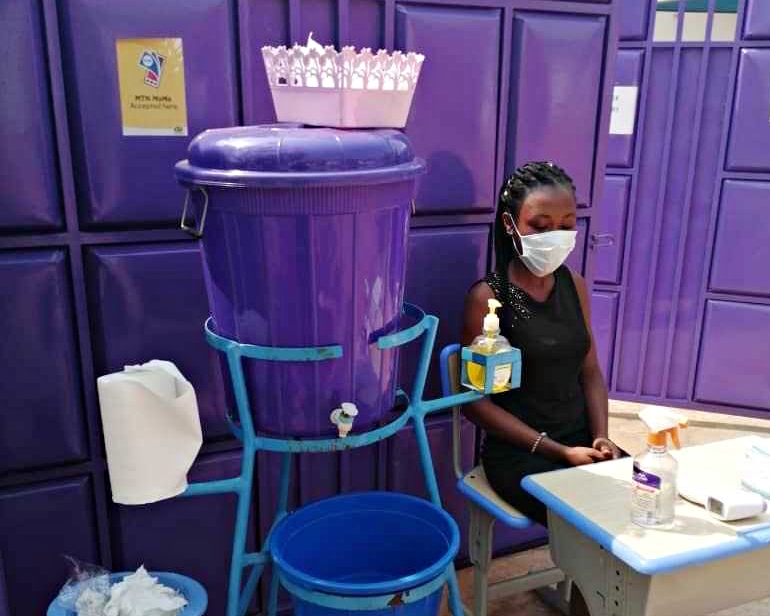International Women’s Day 2021 – Getting Girls back to Classrooms in Ghana and Kenya
At its peak in May 2020, COVID-19 related school closures left 85% of students globally out of the classroom. Experience from previous prolonged school closures – such as the 2014 Ebola pandemic in West Africa - indicates that once children are out of the classroom, there is greater risk they will never return. This is especially true for adolescent girls, who face higher pressures that can lead to permanent drop-out, including early marriage, teenage pregnancy, sexual assault, pressures to support family income, and other biases that can elevate boys’ education over girls when family resources are strained.

While there have been reports of similar negative impacts on girls during the recent temporary school closures in both East and West Africa, there are some indications that government leaders want to learn from past experiences to ensure all children – including girls – return to the classroom. While in 2015 Sierra Leone notoriously banned ‘visibly pregnant’ girls from returning to school after the Ebola pandemic ended, in March 2020 the Education Ministry announced the lifting of this ban, allowing pregnant girls to attend school and sit for exams. Similarly, in Kenya the government has taken action to guarantee pregnant school-aged girls receive medical care and are able to return to school as classes reopen.
Opportunity EduFinance is leaning in to this positive momentum and supporting school leaders to help ensure girls get back to school and continue learning. School Leaders are sharing successful strategies with their peers in their cluster meetings. Many are finding strong parent engagement and open communications with families to be essential.
On this International Women’s Day 2021, our team members in Ghana and Kenya have shared updates on the current situation they see around girls returning to school.
Girls Returning to School in Ghana
by Mina Sarpong and Lordina Omanhene-Gyimah

We generally have more girls than boys in school, but since we reopened after the closure, some teenage girls couldn’t return to school due to relocation and financial reasons.
The main challenge is teenage pregnancy. We have had a few cases of teenage pregnancy following the school closures and majority of these teenagers did not return to school. We had a few of them who returned, and their classmates were pre-informed to avoid discrimination. Eunice Apodei, School Head at Victory Home International School, Ashaiman, Ghana explains, “We generally have more girls than boys in school, but since we reopened after the closure, some teenage girls couldn’t return to school due to relocation and financial reasons."
Teenage girls risk early marriage as well, especially in some northern parts off the country. Another challenge is the financial capabilities of parents. The discrimination between teenage boys and girls in education was gradually disappearing in Ghana. However following the crisis, a few parents focused on sending their male teenagers back to school, whilst their female counterparts are kept at home to cook and continue to take care of affairs, until their parents have raised enough money. Others were sent off to live with relatives or family friends in other vicinities to work as helpers in the homes and were unable to return to schools when they opened.
The government for its part, is putting measures in place to ensure the gender parity in schools, especially for teenagers, since that is where we see the sharp decline in number of girls. There are incentive packages and initiatives which are meant to motivate teenage girls to return to school and strive for the best. There is the lower cut off-point initiative for teenage girls during senior high school placements. Girls are also encouraged to take up STEM related subjects. The Domestic Violence and Victim Support Unit (DOVVSU), and the Women and Juvenile Unit (WAJU) are institutions set by the government to protect the rights of girls and women at large.
Girls Returning to School in Kenya
by Anne Njine and Violet Akinyi Oketch
-side.jpg)
Through the intervention of the school directors, both girls have recently reported back to school after giving birth and will be sitting for their National Examinations this March to help them to transition to the next level of their lives.
Although there were programs by the ministry to engage learners during the school closure, not much was realized since most of the learners could not access the online learning due to lack of technology. The effects of the long school closure on girls were evident when it was reported that many teenage girls were pregnant and might not go back to school.
On 3rd March 2020, the government of Kenya launched a National Campaign against Teenage Pregnancies, through the National Council for Population and Development seeking an end to teen pregnancy. The campaign was focused on galvanizing communities on the need to end teen pregnancies through awareness and advocacy.
The Ministry of Education has offered support, one of the measures that has been put in place is psychosocial support for the girls. This has been made possible by training teachers on life skills, guidance and counselling to effectively support the girls. The proposed Care and Protection of Child Parents Bill, 2019 compels school administrators to unconditionally readmit teenage mothers at least 12 months after delivery. The Ministry of Education has compelled all the head teachers to readmit pregnant girls back to school. Parents have also been asked to take their daughters back to school. Head teachers have been told to ensure that the pregnant girls are comfortable at school and to offer sponsorship when needed.
We have seen these positive interventions on behalf of girls up close this year. Two girls in our EduQuality program schools fell pregnant, a 13-year-old in rural Kenya and a 17-year-old in an informal settlement who were both sitting for National Examinations this year.
Both girls kept the pregnancies secret from their parents and guardians but were able to open up to the school leaders who frequently kept in touch with their learners. The 17-year-old ran away from home but due to the good rapport with the school leader, she went back home after a counselling session offered by the school. Through the intervention of the school directors, both girls have recently reported back to school after giving birth and will be sitting for their National Examinations this March to help them to transition to the next level of their lives. The school leaders continue to encourage and support them to ensure that they are comfortable and in a good state.
One good thing is that the leaders are ready to support the girls and their families as they partner with other programs e.g., Government programs that have been put in place to support the education of girls.
International Women’s Day 2021
Today on International Women’s Day (IWD) people around the world are celebrating women’s achievements, raising awareness against bias and taking action for equality. In line with the theme of this year’s IWD - ‘Choose to Challenge’ - Opportunity EduFinance continues to challenge gender inequality in education and work for increased access. Across the countries we work in, our Education Specialists, partner school leaders and wider team are working tirelessly to ensure that girls return to school and that the Covid-19 pandemic does not result in a step backwards for the education of girls.